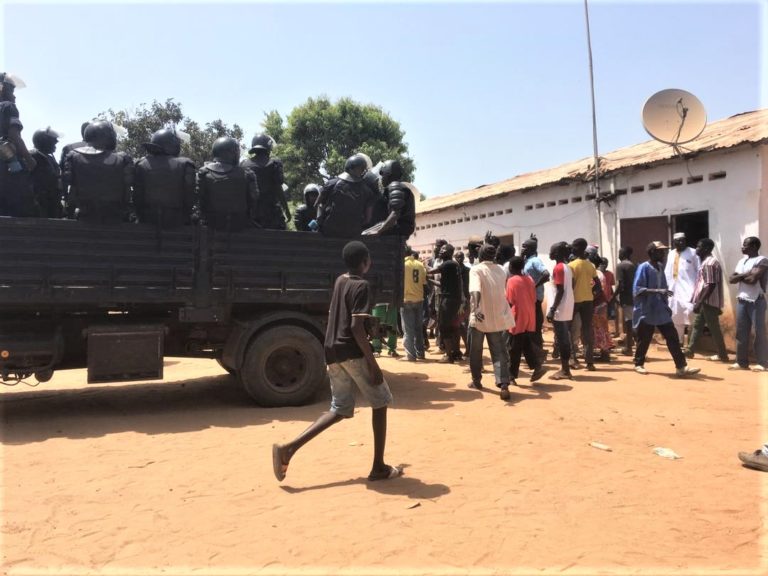
Franklin Roosevelt 32nd President of the United States said: “nothing happens by accident in politics, anything that happens in politics was programmed to happen”.
Considering what is going on throughout the Gambia, one can conclude that inducing anarchy is always the first step towards the imposition of an authoritarian regime. Is the breakdown of law and order happening by accident or is it a precursor to obtaining emergency powers? Unless I have read my history and political science upside down, this country is facing the prospect of anarchism and fascism confronting each other in a life and death struggle. We better be careful to expressively repeal the Public Order Act. All that is required is a simple repeal of the laws.
The Public Order Act was conceptualised in a colonial setting in which native African ancestors were subjects and not citizens. To elevate it in the manner now seen in the Gambia is to defeat the very essence of Independence of the Gambian people. It compromises our inherent right to assemble and self-determine our path as a nation of free citizens as opposed to bondsmen and women.
The law as it is presently constituted is the antithesis of a democratic society because democratic societies survive on the exchange of ideas formulated in a culture of free interaction and association. This “free market of ideas” is one of the most defining elements of our nature as human beings. It therefore not only informs our dignity and rationality but gives life to our place in society – a democratic society properly so called the sovereign republic of the Gambia.
In 1993, the UN Special Rapporteur on Freedom of Assembly, states that the exercise of the freedom of Assembly should not be subject to previous authorisation by the authorities. The most a prior notification procedure should do is to facilitate the exercise of the freedom of Assembly by taking measures to protect public safety and order and the right and freedom of others. The primary duty of the police is to protect citizens who may wish to assemble from any molestation.
The Gambia Police Force hides under the fig leaf provided by Section Dr5 of the Public Order Act, which is nothing more than a permit system. The Police manage this arbitrary system in ways that pay no heed to fundamental constitutional duties and thus, interferes with the citizens’ right to freedom of Assembly.
It, therefore, calls for a severe recollection of Gambians that Freedom of Assembly is the lifeblood of democracy. It helps create spaces for collective politics, and secondly, it is essential in democratic politics because it is only through meetings, dialogues, talking and communicative action with fellow citizens that we can critically explore the various beliefs and values which animate policy decisions. The more ideas are discussed, the better and more legitimate political decisions are likely to be.
The Public Order Act in its present form is unconstitutional because it shrinks the public spaces and removes the grounds of public engagement from the citizens – leaving them on free fall and directionless in the face of politics and policies that determine their collective destiny.
The United Nations Human Rights Committee’s decision in (1990) dealt with a situation where the Finish government arrested the complainant for convening a public gathering without notice to protest a visiting head of state. The Committee held that the notice requirement amounted to a restriction of the right to assemble in article 21 of ICCPR. It stated that: “freedom of Assembly is a fundamental right in a democratic society and as the right to freedom of expression, is one of the foundations of such society.” The European Court of Human Rights has similarly held that “the right to freedom of Assembly is a fundamental right in a democratic society and, like the right to freedom of expression, is one of the foundations of such society.”
The Public Order Act provides that where it is not possible for the police to adequately police any particular public meeting, procession or demonstration, the regulating office of the area shall, at least five days before the date of the public meeting, procession or demonstration, inform the conveners of the public meeting, procession or demonstration in writing the reasons for the inability of the police to police the public meeting procession or demonstration and shall propose an alternative date and time for the holding of such public meeting, procession or demonstration and other section of the Act provides that whenever the police notify the conveners of a public meeting, procession or demonstration that it is not possible for the police to adequately police any proposed public meeting, procession or demonstration, such public meeting procession or demonstration shall not be held.
On the face of it, it is clear that the state has wholly expropriated the people’s public sphere through the police. The full amplitude of powers and arbitrariness granted to the police is horrifying when looked at in the light of the potential abuse it can be used to meet out to citizens. The dubious nature of the law is manifest in the amalgam of undertakings which citizens must undertake in the light of the provisions of Section 5 of the amendment.
The amendment, therefore, is a textbook exemplar of an unconstitutional amendment. Although section 5 introduced requiring a permit to requiring notification; the conditions attached to the notification are such that in substance of the section in the Act requires a permit and is therefore unconstitutional.
To further clarify this, it is essential to draw attention to the ordinary meaning of the operative words of the law in issue. The Oxford English dictionary defines “permit” as “an official document granting authorisation.”
In contrast, it defines notification as “to make known.” The amended section in the Public Order Act outlines numerous conditions for the holding of an assembly, and the applicants have to wait for police authorisation before they can proceed to hold the Assembly. Section 5 gives the police absolute power of determining whether an assembly, meeting or procession should take place.
In the US case of (1969), the Court found that the city commission’s power to refuse permission for a procession on such vague criteria as “public welfare, safety, health, decency, and public morals” was unconstitutional and concluded that this created an avenue for arbitrariness. It struck down the legislation, similarly, in (1969), the Supreme Court unanimously upheld the First Amendment rights of peaceful civil rights protestors over the overzealous actions of police attempting to quell anticipated civil disorder. The law was criticized for prohibiting lawful and constitutional activities and for not being narrowly tailored.
The Constitution does not envisage this scenario—that an individual whoever that might be should be made the sole and unquestionable determinant of what is reasonably justifiable for the entire citizenry of the Gambia regarding the exercise of their rights of Assembly.
The Constitution does not in any way intend that the enjoyment of the rights and freedoms enshrined in the constitution be conditioned or contingent on the opinion of an official of the executive arm of government.
Alaw which confers a discretion on a public official without indicating with enough precision the limits of that discretion does not satisfy the quality of the “law” contemplated in the constitution by the requirements of prescribed law.
Indeed, to imagine that the citizens will vest such vast and potentially wild powers in the police will be to suggest that they have predetermined their liberties and freedom. Such bondage is not reasonably foreseeable in any constitutional democracy.
Legislations requiring a permit before an assembly can be held and criminalising failure to obtain a permit, have been universally condemned as unconstitutional and a violation of the right to Assembly.
By Alagi Yorro Jallow











Recent Comments